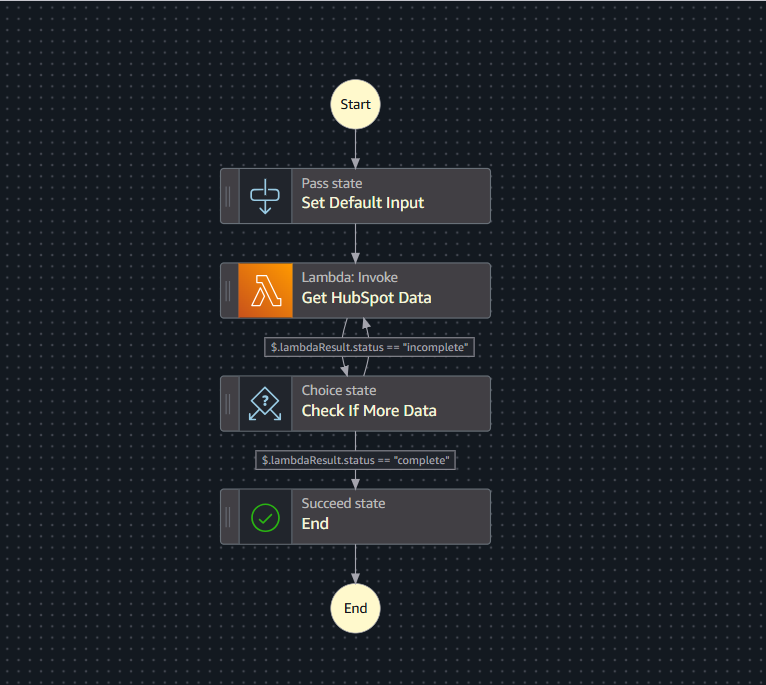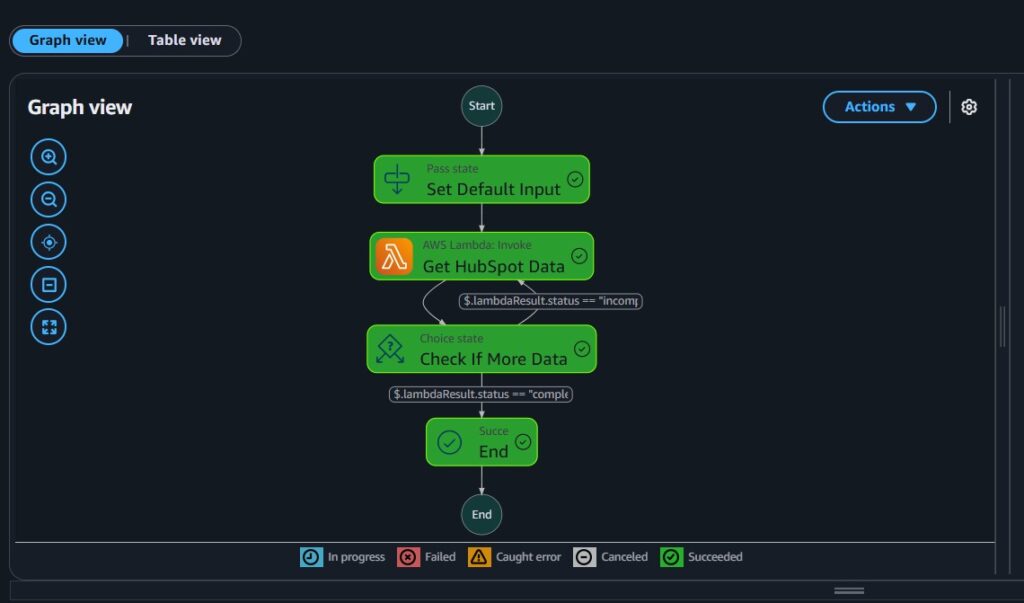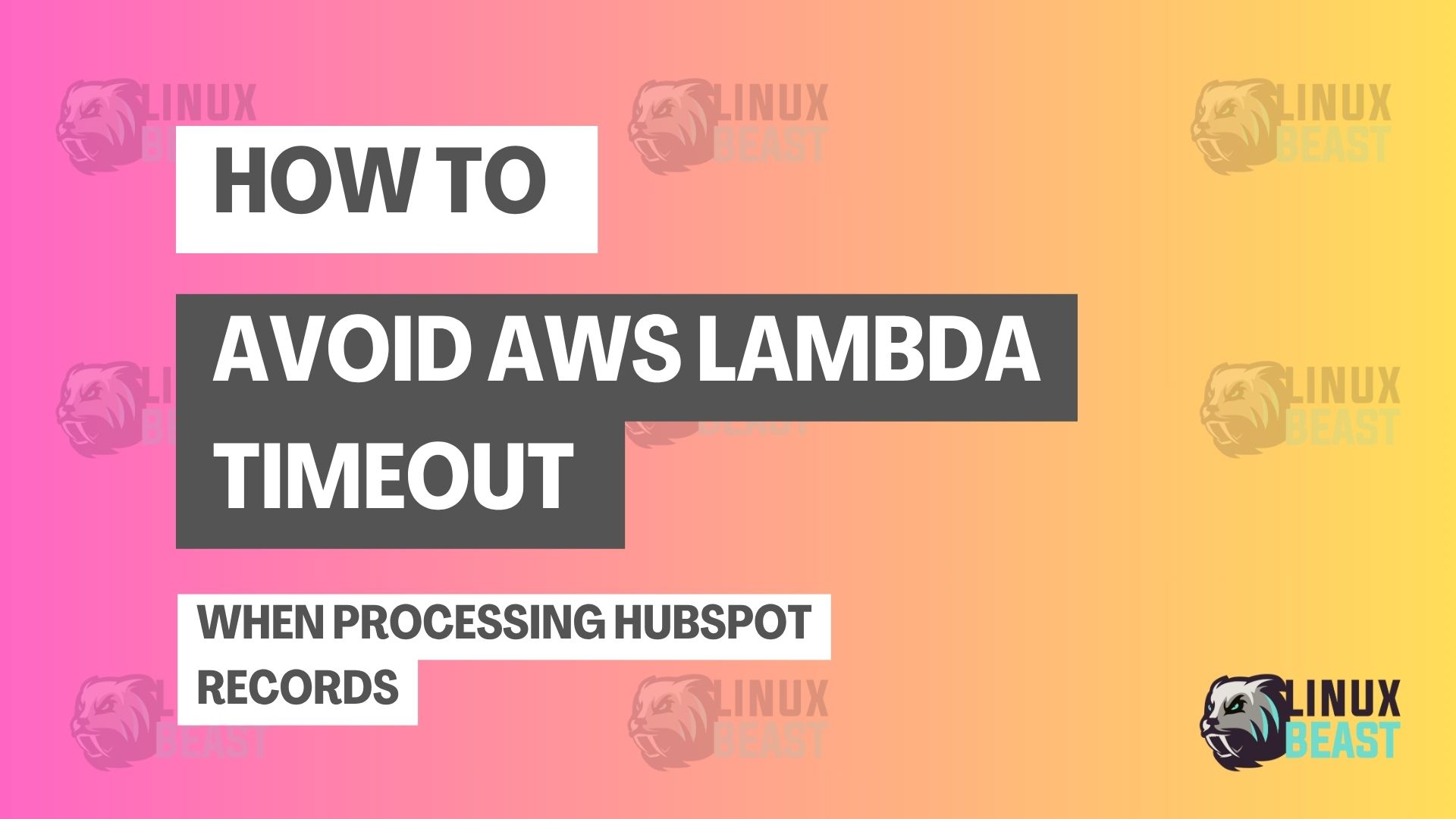🧠 The Problem
When using AWS Lambda to process HubSpot objects records (specially for company data), there is a limit. One Lambda function can only run for up to 15 minutes. If it takes longer, it will stop automatically.
This happened in our setup. The Lambda logs showed this error:
Task timed out after 900.10 seconds
We were using batch processing, but it failed because the data was too big.
✅ The Solution
To solve the issue, we used AWS Step Functions. It helps by calling the Lambda function repeatedly, allowing us to fetch HubSpot records in smaller chunks (batches). This way, the Lambda won’t hit the timeout limit.
The Step Function works like this:
- Start with default input (offset = 0)
- Call the Lambda function to get records
- Check if there is more data
- If more, call Lambda again
- If done, finish the process
⚙️ Step Function Code (State Machine)
{
"Comment": "State Machine to process HubSpot records in batches",
"StartAt": "Set Default Input",
"States": {
"Set Default Input": {
"Type": "Pass",
"Result": {
"lambdaResult": {
"offset": 0
}
},
"ResultPath": "$",
"Next": "Get HubSpot Data"
},
"Get HubSpot Data": {
"Type": "Task",
"Resource": "arn:aws:lambda:us-east-1:<AWSAccountId>:function:dev-yourproject-lambda:$LATEST",
"Parameters": {
"offset.$": "$.lambdaResult.offset"
},
"ResultPath": "$.lambdaResult",
"Next": "Check If More Data"
},
"Check If More Data": {
"Type": "Choice",
"Choices": [
{
"Variable": "$.lambdaResult.status",
"StringEquals": "complete",
"Next": "End"
},
{
"Variable": "$.lambdaResult.status",
"StringEquals": "incomplete",
"Next": "Get HubSpot Data"
}
]
},
"End": {
"Type": "Succeed"
}
}
}
Example Output:

🧑💻 Lambda Function Code (Python)
def lambda_handler(event, context):
start_time = time.time()
offset = event.get("offset", 0)
while True:
records, next_offset = function_to_get_company_records(offset)
if not records:
break
for record in records:
function_to_process_company_records(record)
if not next_offset:
break
if time.time() - start_time > TIME_LIMIT:
return {
"status": "incomplete",
"offset": next_offset
}
return {
"status": "complete"
}
Additional Note: Handling Mid-Page TIME_LIMIT Triggers
While the script above gives you a solid starting point, there’s one scenario you can optimize for:
Problem
If TIME_LIMIT triggers mid-page, your current logic returns next_offset (the cursor for the next page). This causes any unprocessed records remaining on the current page to be skipped.
Two Approaches to Solve This
A) Simple (Reprocess Entire Page)
- Return
current_offset(instead ofnext_offset). - This means you’ll start processing the same page again on the next run.
- Requirement: Your processing logic must be idempotent, so duplicate processing is safe.
- Advantage: Easiest to implement with minimal complexity.
B) Precise Resume (Track Index Within Page)
- Return not only the
current_offset, but also aresume_index(indicating the next record position in the page). - On the next invocation, re-fetch the same page, skip already processed records (via
resume_index), then continue. - Only after processing the full page do you move to
next_offset. - Advantage: No duplicate processing, no skipped records—much more precise.
Comparison Table
| Approach | Offset Returned | Duplicates Risk | Complexity | Best For |
|---|---|---|---|---|
| Reprocess Page | current_offset | Possible | Low | Simple workflows, safe idempotent logic |
| Precise Resume | current_offset + resume_index | None | Medium–High | Critical workflows, no duplicate tolerance |
Choose Approach A if you need a quick fix and can guarantee idempotency. Opt for Approach B if completeness and precision matter more, especially in production environments.
✅ Result
After using AWS Step Functions, the Lambda function now works without timing out. It can handle large HubSpot data by splitting it into smaller parts and processing them one batch at a time.

This setup improves reliability and avoids hitting AWS Lambda limits. It is now scalable and ready for bigger datasets.
📌 Key Takeaways
- Lambda has a 15-minute max timeout (900 seconds)
- HubSpot data can be large, so use pagination
- Step Functions help repeat the Lambda task until finished
- This design pattern is serverless, scalable, and cost-effective

